Curious Expedition: Explor-taition At Its Finest
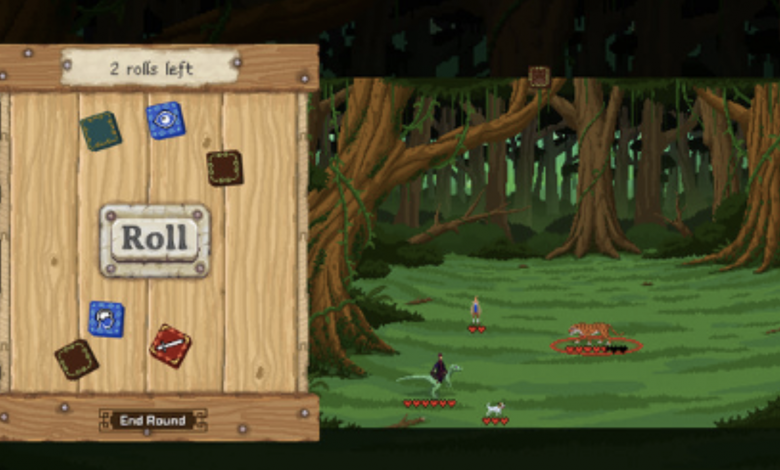
James Sullivan ‘22 / Emertainment Monthly Staff Writer
As children, everyone had dreams and fantasies about traveling to exotic lands, meeting fascinating people, brutalizing them with biological warfare and Eurocentric colonial policies, and then picking through their crumbling societies to steal their things and put them in museums. Admittedly, history teachers tend to quickly mumble that last half under their breath, so the uglier bits were never particularly emphasized on the playground. But if you overlook all the bits you were conditioned to overlook, the core of that fantasy- the exploration, the discovery, the pulpy, hamfisted adventure in lands long forgotten — has an inescapable appeal. Especially now, when everyone’s been stuck in their houses for months on end and the fleeting eye contact you make with the bagger at the supermarket can count as your socialization for the week.
Curious Expedition is a rogue-like turn-of-the-century exploration game that places players in the company of Indiana Jones, Alan Quartermain, Captain Nemo, and a host of other grabby bastards who couldn’t keep their hands to themselves. This inaugural title from independent developer Maschinen-Mensch casts you as one of several adroit adventurers who’ve entered a contest to see who can execute the most impressive expedition. To win, you’ll have to guide your chosen adventurer and their party through a series of six increasingly dangerous missions to untamed lands without getting killed in the process. Will you be able to balance your limited resources and the burgeoning violent neuroses of your hirelings against your desire to crawl around in poorly lit caves and inadvertently initiate extinction events?
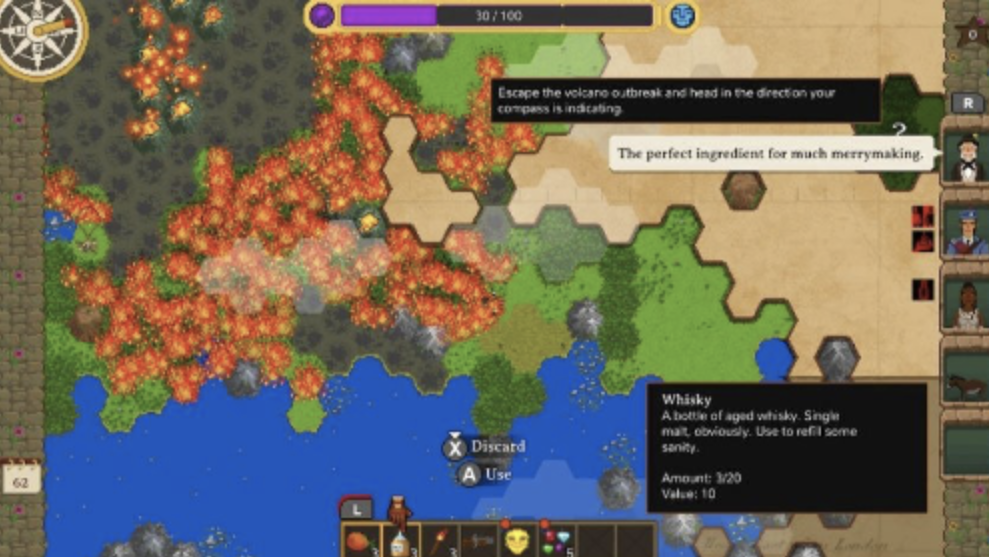
You will not.
Curious Expedition has a tense but intuitive gameplay loop. After picking an adventurer from a roster of historical figures (Charles Darwin, Alistair Crowley, Nikola Tesla, etc.) you and your party are set loose on a hexagonal world map, with the end goal of locating a great golden pyramid hidden somewhere in the randomly generated game world. You have three main resources to manage. First is your fame, the ultimate measure of victory, which you can increase by completing your journey quickly or by donating the treasure you find to the museum. Next is your funds – vital for equipping your expedition – which you can increase by selling your treasures or by completing optional side quests handed out at the start of each expedition. In the field, however, your most valuable resource is your sanity. Traversing the map consumes your sanity, and when you run out entirely your party members will, in the following order, start killing and eating each other, themselves, and you. It behooves you to seek out friendly villages, outposts, and natural landmarks where your party can rest and recover in between committing archeology crimes.
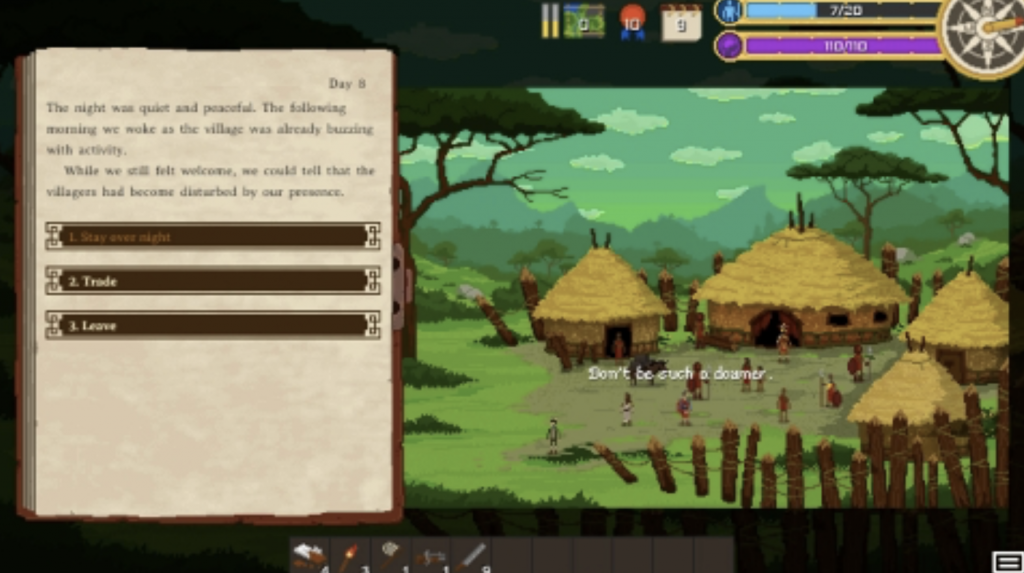
And you will commit so, so many archeology crimes. Finding the pyramid is only the bare minimum of what’s expected of you; from the moment you leave your boat, you’re on the clock to complete the run before the five NPC explorers return from their own simulated expeditions and steal your thunder. In this way, you’re forced to constantly make trade-offs. Do you charge ahead at a break-neck speed to secure a bonus to your fame score, or do you play at a safe pace and make up the deficit by bringing home extra artefacts? Do you leave your inventory empty so that you can make off with said artefacts, or do you load yourself down with equipment you may or may not end up needing? You’ll always be juggling something, but the resources you need to address and consider are always well-telegraphed enough that you’ll be making an informed decision. If you encounter a shrine marked up with severed heads and protective wards, for example, you’ve been given a pretty good sense of what’ll happen if you steal the treasures.
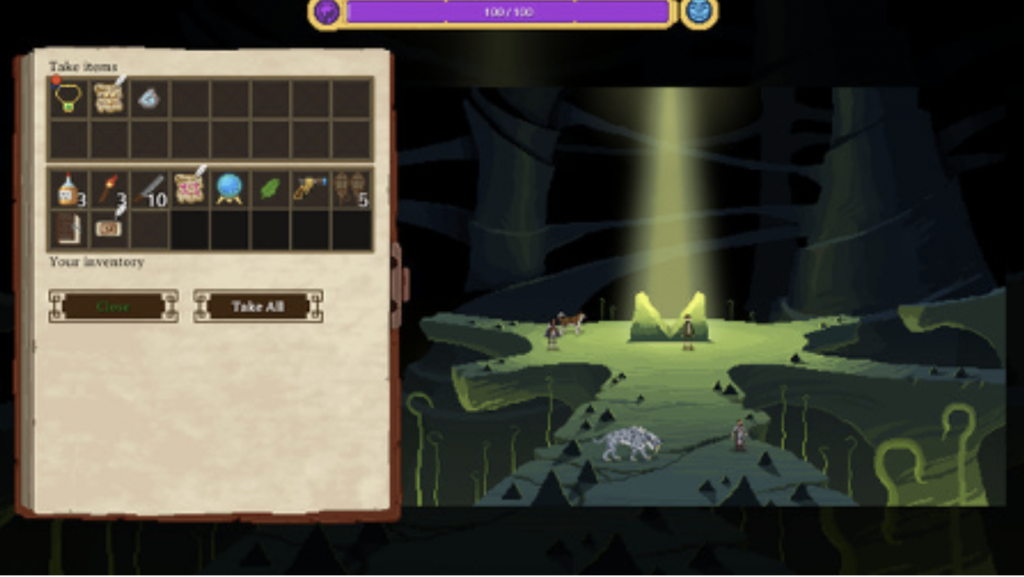
One of the stand-out elements is the understated but vital dice-based skill system. Combat is decided by rolling a number of colored dice and combining two or more of the results to execute unique moves. If you roll two red swords and a green shield, for example, you could pair the swords together to perform a high damage attack, or pair one sword with the green shield to cast a move that does less damage but also places a defensive shield over your party. Different companions add different sets of dice to the party’s dice pool, radically altering the kinds of combinations you can put together during fights. Your long-term strategy involves leveling up your characters to expand your dice pool, cover your weak points, and gain more possible results to work with, but combat is quick and fun and involves making snap decisions about what combinations are more likely to get you out of the mess alive. It’s a fantastic balance, and even after several runs the tension of combat doesn’t lessen or cheapen.
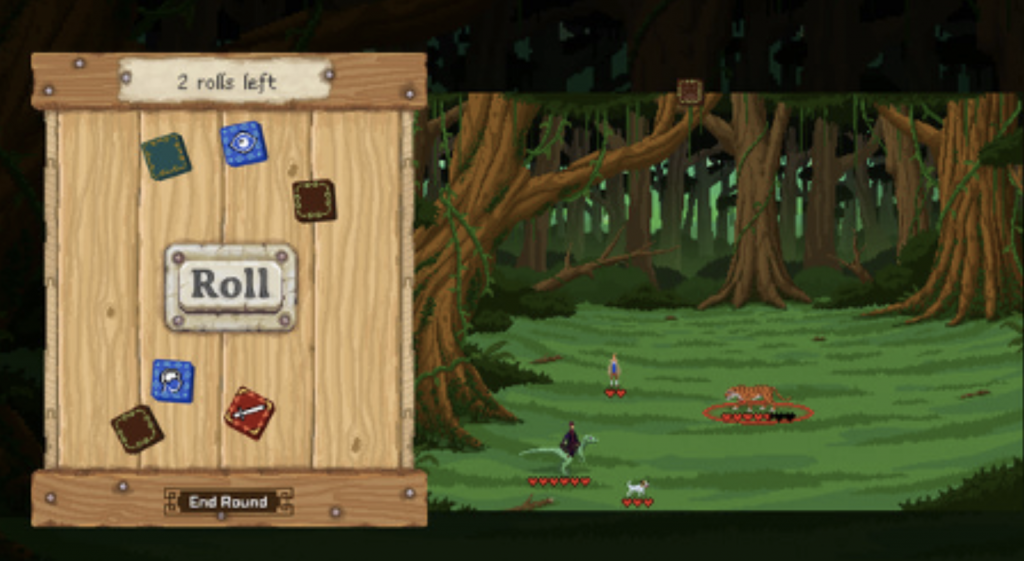
The game has a charming atmosphere, marrying minimalist character sprites with gorgeously detailed pixel environments. Encounters, events, and explorations are narrated through a faux-Victorian journal interface, with a brief, past-tense first-person recounting of the choices you make, playing into the Jules-Verne-ish trappings of the game. You have to appreciate games that try and use prose to do the heavy descriptive lifting, even if you start to notice the fairly limited pool of unique encounters after about a dozen runs. The skeleton for something truly amazing is there, even if the game doesn’t always deliver on the meat.
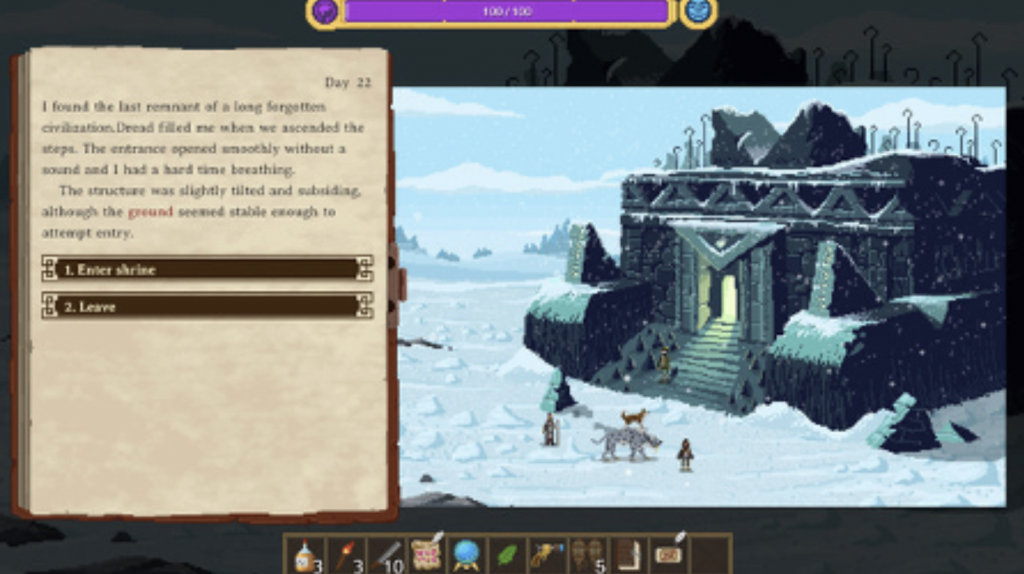
What a perfect segue into several paragraph’s worth of kvetching.
Curious Expedition marries a fleshed-out RPG framework with a weird lack of internal continuity, and it’s not a happy marriage. Party management is a huge part of the game. Over the course of your adventure, your party members will develop neuroses, quirks, and rivalries in response to events, encouraging you to manage and invest in their individual wellbeing… and then your party is wiped clean, win or lose, at the end of the six-level run, and you start again with a new set of accomplices; new names married to the same character portraits. You gain experience by mapping out points of interest… on a world map that you’ll never revisit once you clear the level. The text-based encounter system is fun and charming… until the finite pool of encounters runs smack into the fact that a full round of the game only takes about an hour to play, and you can plausibly run into the same side quest or random event three times in three hours. The only thing that carries over between runs is character unlocks, and that’s only impactful until you hone in on a character that fits your chosen playstyle. A game so heavily rooted in exploration and discovery does not benefit from such a lack of permanence. Obviously, your choices don’t mean anything – it’s a video game – but there are games where it takes hundreds of hours to remember that fundamental truth.
Beyond its impacts on the game’s longevity, though, the lack of permanence plays into some subtly toxic messaging. Curious Expedition does not flirt with colonialism. Curious Expedition takes colonialism to the nightclub bathroom and months later ends up paying colonialism a fortune in child support. Most of the gameplay loop consists of breaking into places that aren’t yours, stealing sacred objects that don’t belong to you, and getting away with it because you aren’t doing it in Europe specifically. These are not uninhabited lands you’re exploring; each map is dotted with villages full of “natives” (undifferentiated, poorly characterized natives) who become increasingly incensed with your presence the longer you overstay your welcome. And not without reason, either; most of the relics you’ll find during the game are wildly, violently cursed. Taking them from their resting places invariably triggers ecological catastrophe, like desert tiles converting into tundra, rendering your chosen equipment wildly out of place. Chasms open up and block off parts of the map, floods wipe away entire traversable areas.
The game trains you to evaluate the risks and rewards of triggering these calamities, sure, but it’s always a question of whether your party can outrun the spreading zone of death, whether you’ll have a clear route to your ultimate goal when the map is done changing, whether you’ll be able to do without the support – or endure the active, militant hostility – of the locals. Left out of the game’s framing entirely is the question of the long term impact you’re having on the local ecosystem, and what it’s going to mean for the people who, you know, live there. Inside of ten real-world minutes, you and your party will either be dead, or you’ll have gallivanted off to some new exotic locale, but you’re never really made to reckon with the long-term consequences of what you’ve done. The locals are framed as an obstacle to be violently circumvented at worst, and a resource to be carefully managed at best, but you’re never taught that their wellbeing is truly important in and of itself. Something that’s explicitly a game in-universe for the player characters translates into a total societal collapse for the locals, but that’s fine! It’s all fine. Collect your loot and go.
To be fair, it’s possible to play the game without acting like an exploitative bastard. You still get points for mapping landmarks, collecting butterflies, and clearing each level swiftly. It’s just not possible to win – and it doesn’t feel like the game is trying to make any larger points about the colonialist mindset, either, because again, the consequences of everything you do, good or bad, win or lose, are nullified within an hour. There’s no real-time to explore the greater consequences of what they’re doing, and no indication that was a design priority. Sometimes while resting, your character will wax poetic about whether the hardships are worth it. Sometimes while resting, your character will be tormented by visions of party members who’ve died or been cast aside in your quest for glory. The impact is lost in translation, as it’s one more randomly generated name, attached to one more randomly selected sprite.
In conclusion, it’s good for what it is, and there aren’t a ton of games attempting to occupy the same aesthetic niche, but it doesn’t do a good job of wrangling with the uglier side of its chosen genre, and the small scope gets repetitive quickly. Buy it if it goes on sale.